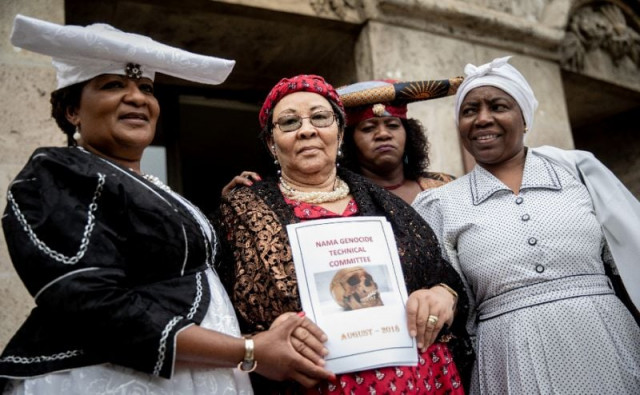Indigenous Namibians urge Berlin apology for 'colonial genocide'
German occupiers killed an estimated 60,000 Hereros and 10,000 Nama people after they rose up against colonial rule

PHOTO AFP
The appeal by representatives of the Herero and Nama people in Berlin came ahead of a ceremony this week where Germany will formally hand back human remains that were spirited away from Namibia after the 1904-1908 massacres.
Esther Utjiua Muinjangue, chairwoman of the Ovaherero Genocide Foundation, said the handover would have been "the perfect opportunity" for a long-awaited apology.
"Is that asking too much? I don't think so," she told a press conference in the German capital.
Saving Namibia's cheetahs: another female pioneer to the rescue
An official expression of regret would make it possible to "heal the emotional wounds" and find closure, she added.
The German occupiers of what was then South West Africa killed an estimated 60,000 Hereros and 10,000 Nama people after they rose up against colonial rule, in what historians call the first genocide of the 20th century.
The German government said in 2016 that it planned to issue a formal apology as part of discussions with the Namibian government on coming to terms with the dark chapter.
The negotiations are still ongoing however.
Crucially, although Germany has acknowledged that atrocities occurred at the hands of colonial authorities, it has refused to pay reparations.
Berlin has argued that its development aid worth hundreds of millions of euros since Namibia's independence from South Africa in 1990 was "for the benefit of all Namibians".
No survivors: Missing Mozambique plane wreck found
Herero and Nama representatives have rejected this reasoning, and filed a class-action suit against the German government in a US court.
"There has to be compensation," Namibian lawmaker Ida Hoffmann, representing the Nama Genocide Technical Committee, told reporters in Berlin.
The New York judge in the case has yet to rule on whether to hear the lawsuit.
Aside from financial compensation, the plaintiffs also want to be included in the Namibian government's discussions with Berlin aimed at reaching a joint declaration on the massacres.
Germany wants the lawsuit thrown out on the grounds of state immunity for prosecution.
The German foreign ministry said Wednesday's ceremony to return some of the human remains unlawfully taken from Namibia — including 19 skulls, five skeletons and a scalp — marked another step in Berlin's reckoning with its colonial history.
The remains were used for discredited "scientific" experiments at the time to prove the racial superiority of white Europeans.
But activists have criticised the handover proceedings, which will see a German minister of state return the remains to a Namibian government delegation at a Berlin church service, as too low profile.
German historian Christian Kopp of the non-governmental group Berlin Postkolonial told AFP that the ceremony should take place "in the German parliament and be accompanied by an official apology".



















COMMENTS
Comments are moderated and generally will be posted if they are on-topic and not abusive.
For more information, please see our Comments FAQ